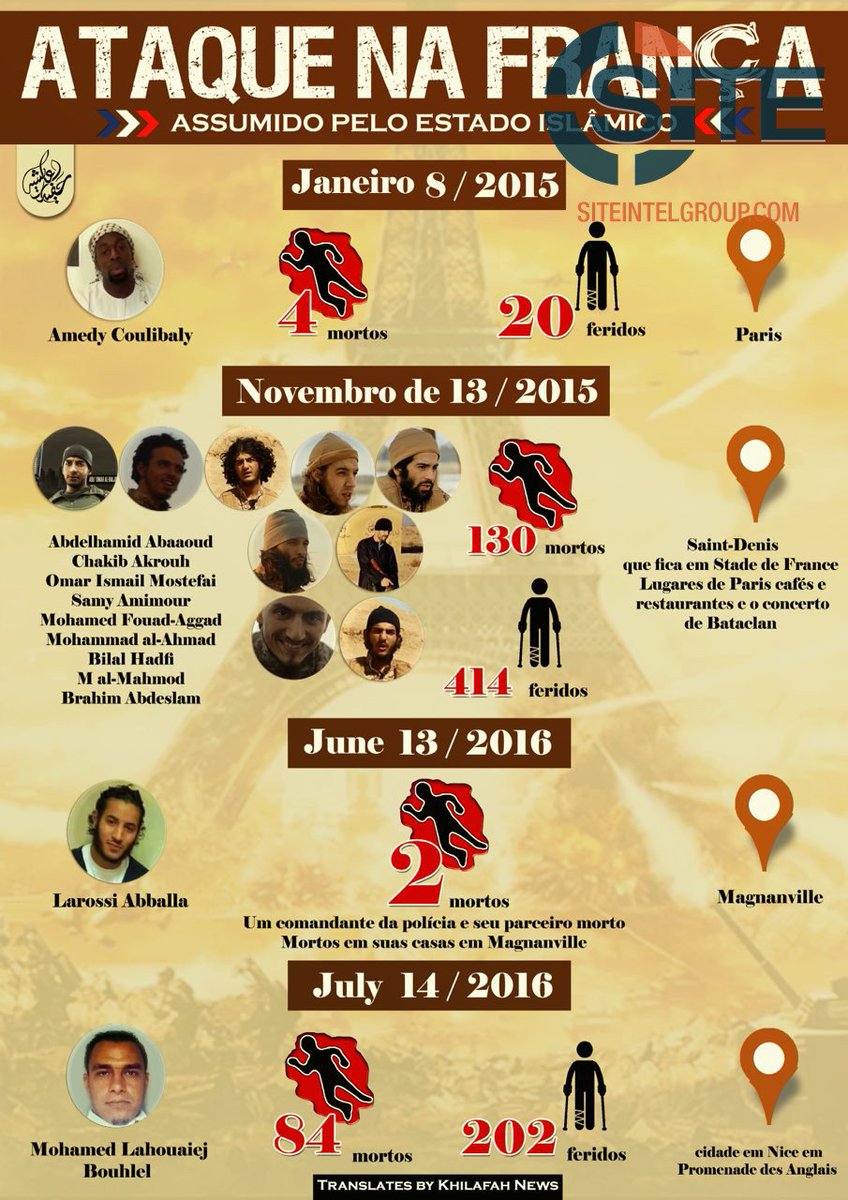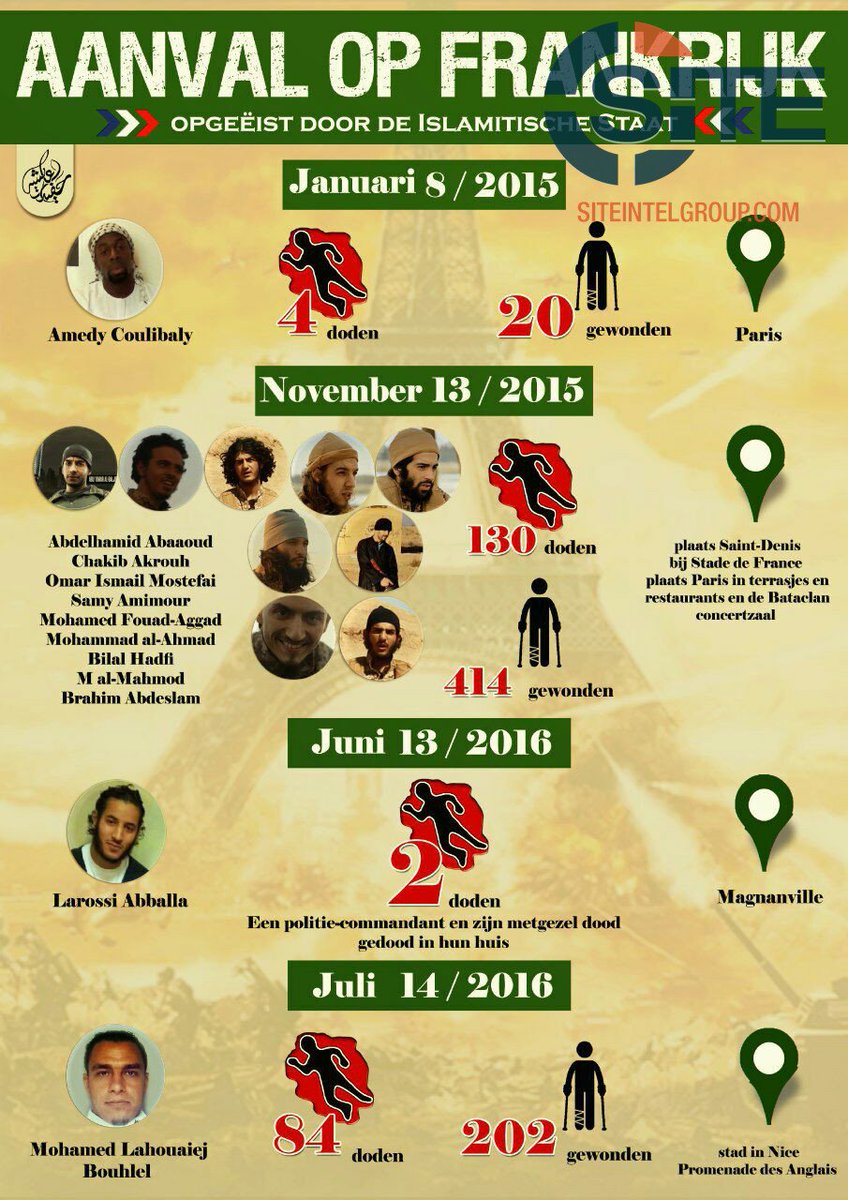Published by this website on June 22, 2016: Brazil/Olympics Under Islamic State Threat
Pro-ISIS “Ansar al-Khilafah Brazil”: If French police couldn’t stop France attacks, then their training Brazil’s police will serve no use.
Pro ISIS “Granddaughters of ‘Aisha” later published its infographic on France attacks in Dutch, French, Portuguese
Reacting to Baton Rouge shootings, a jihadi Telegram channel urged supporters invite “black community” to Islam and help it fight U.S. govt
A Telegram channel called “Ansar al-Khilafah #Brazil” posted a pledge of allegiance to #ISIS leader Baghdadi

Pro #ISIS “Granddaughters of ‘Aisha” later published its infographic on #France attacks in Dutch, French, Portuguese



Four terror suspects ‘tried to travel to Brazil for Olympics’
Telegraph: Four suspects with known links to terrorism attempted to travel to Brazil for the Rio 2016 Olympics, it has emerged.
The four, whose identities have not been revealed, applied for accreditation for the Games and were among the 11,000 to be denied on security grounds, according to Brazilian security services.
They featured on a list of 40 who are subject to international alerts and are being monitored by intelligence agencies.
Brazilian authorities have formed an Integrated Anti-Terrorism Centre (Ciant) for the Olympics and are working with security agencies from the US, UK, France, Spain, Belgium, Paraguay and Argentina.
“We did a scan on all national databases and also, in the spirit of international cooperation, a trace of information with these global partners,” Andrei Augusto Passos Rodrigues, national security coordinator for Rio 2016, told magazine show Fantastico on Sunday night.
“Approximately 460,000 inspections were done and of these, around 11,000 were not recommended for accreditation.”
There were also more than 60 Brazilians with active warrants who applied for accreditation for the Olympics, Mr Rodrigues added.
Accreditation for the Games is required for all media, VIPs, officials, athletes and other staff who require access to restricted areas and also acts as a visa for entry to Brazil. Authorities did not say in what capacity the four suspects had applied nor from which country.
Officers at the Ciant centre, which is headquartered in the capital, Brasília, are monitoring Rio 24 hours a day.
Among the areas covered are hotels where Olympic officials and VIPs will stay, Games venues and training sites.
On Friday, Brazilian authorities deported a French-Algerian particle physicist who had been convicted of terror-related crimes and was working as a visiting professor at the Federal University of Rio de Janeiro (UFRJ).
Security forces also carried out an anti-terror training exercise on Saturday at one of the stations near the Deodoro Olympic venue cluster.
Cristiano Sampaio, general coordinator for public security at the Games, said there was no identified threat of a terror attack against Brazil but said the level of alert had been raised since the Bastille Day attack in Nice.
“Today, in the absence of a concrete threat to Brazil, we are on yellow alert, which is characterised by increased attention and the level of response in relation to everyday life,” he said.
“This can develop into an orange or red alert according to any specific threat that is identified in relation to Brazil.”
Brazil to Boost Rio Olympics Security After Nice Attack
Brazil had already planned to deploy 85,000 police and soldiers to provide security for the Rio Olympics to be held from August 5 to 21.
Brasilia: Brazil said Friday it will bolster security for next month’s Olympics in Rio following the truck attack in the French city of Nice.
Brazil’s interim president Michel Temer held an emergency meeting with his intelligence chief and members of his cabinet late Friday to weigh the next steps after the Nice attack, which killed at least 84 people.
As he left the meeting, intelligence chief Sergio Etchegoyen said new security measures would include extra checkpoints, barricades and traffic restrictions.
Brazil had already planned to deploy 85,000 police and soldiers to provide security for the Olympics — running August 5-21 — double the number used in the 2012 London Games.
Heightened fears, heightened security
Etchegoyen said fears over security at the Rio Games had “gone up a notch” after the attack in Nice, where a Tunisian-born man drove a 19-tonne white truck into a huge crowd gathered to watch the annual Bastille Day fireworks display on Thursday, leaving a gruesome trail of bodies in his wake.
“We’re trading a little comfort for a lot more security,” he told a press conference at the presidential offices.
Brazilian intelligence officials met with French counterparts for a briefing on the Nice attack, he said.
Defense Minister Raul Jungmann expressed “worries” over the Nice attack.
“This worry will translate to more checkpoints, security, staff and procedures being put in place,” he told reporters at an air force base near the Rio international airport.
Jungmann said Brazil is corresponding with all 106 countries sending representatives to the event’s international intelligence center.
“As of now, none of these countries have informed us of a potential or concrete threat of a terrorist attack in Brazil,” Jungmann said.
Brazil is already on alert after the French military intelligence chief said France had been informed of a planned terror attack on its team at the Rio Olympics.
In June, Brazil’s intelligence service said it had detected Portuguese-language messages linked to the Islamic State group on an online forum.
An even more explicit warning came after bloody attacks in Paris in November, when a French jihadist tweeted that Brazil was the “next target.”
Jungmann said officials will supervise the Olympic delegations based on the security threat they face, with countries including the United States and France labeled as high-risk.
“The dozen or so countries in that group will have special accompaniment,” Jungmann said.
Simulation exercises
Security services staged simulation exercises in Rio to test counterterrorism response plans.
Another exercise on “confronting external threats” is planned for Saturday at the railway station in Deodoro, one of four Olympic zones in Rio along with Maracana, Copacabana and Barra da Tijuca.
Rio Mayor Eduardo Paes and Olympic organizing committee president Carlos Nuzman met with federal and regional government officials to assess plans, notably discussing a potential increase in street blockades.
